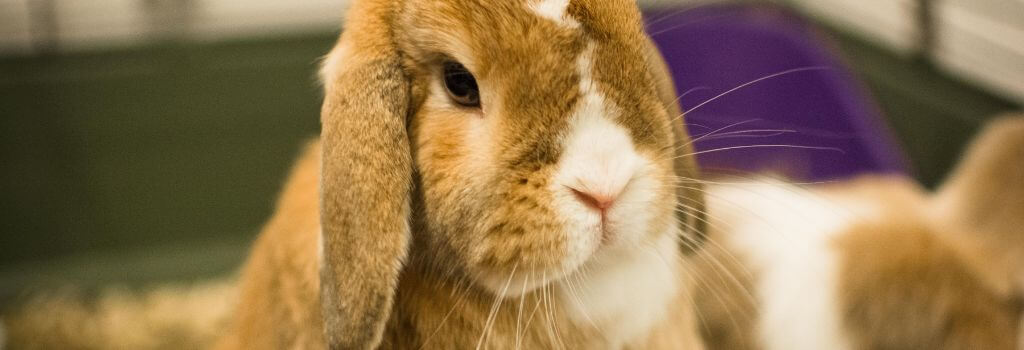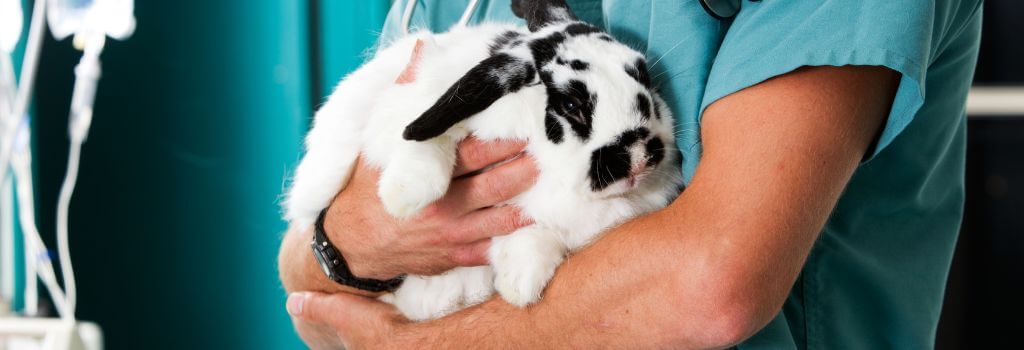Female rabbits make excellent companions and bring joy and personality to countless homes. However, many rabbit guardians are unaware of the importance of spay surgery for their furry friends’ long-term health and well-being.
As veterinarians, we regularly see the transformative benefits of spaying female rabbits — in terms of health outcomes and behavioral improvements. Let’s explore why spaying your female is important and what you need to know as a responsible rabbit guardian.
Health Benefits of Spaying
While preventing unwanted litters is important, the health advantages of spaying female rabbits extend far beyond population control. One of the most compelling reasons to spay your rabbit is cancer prevention. Unspayed female rabbits have a staggering 80% chance of developing uterine cancer by age five. While some breeds, including English and Netherland Dwarf, Dutch, and Dwarf lop rabbits, are more susceptible to cancer than others, any breed can develop this illness. Fortunately, you can eliminate the risk of this potentially life-threatening condition through timely spaying.

Additionally, spayed rabbits typically experience numerous health advantages contributing to their quality of life and longevity. These rabbits generally enjoy longer lifespans than their unspayed counterparts and face a significantly reduced risk of reproductive tract infections. The procedure also promotes better urinary health, reducing the likelihood of related complications. Perhaps most notably, the stabilization of hormones following spay surgery improves overall well-being, helping your rabbit maintain better physical and emotional health throughout her life.
Behavioral Advantages
Beyond the medical benefits, spaying can significantly improve your rabbit’s behavior and quality of life. Unspayed females often exhibit challenging behaviors during their reproductive cycles, including:
- Aggressive lunging or biting
- Excessive marking with urine
- Destructive chewing and digging
- Restlessness and irritability
- Inconsistent litter box habits
Additionally, if you have a male rabbit — even one that is neutered — an unspayed female rabbit will experience repeated false pregnancies.
After spaying, most rabbits become calmer and more affectionate companions. Their litter box habits typically improve dramatically, and their urine becomes less pungent. This makes them more enjoyable to share your home with and simplifies maintenance and clean-up.
Understanding the Spay Procedure
Qualfied veterinarians perform spay surgeries (ovariohysterectomy) while the patient is under general anesthesia. The procedure involves removing the rabbit’s ovaries and uterus through a small incision in the abdomen. While any surgery carries some risk, modern veterinary techniques have made rabbit spay surgery very safe when performed by experienced practitioners.
Rabbit spaying typically includes:
- Pre-surgical examination and blood work
- Careful anesthesia monitoring
- Minimally invasive surgical techniques
- Pain management during and after surgery
- Post-operative monitoring
- Recovery support and follow-up care
Most rabbits recover quickly and can return to normal daily activities within a few days to a week. Your veterinarian will provide specific post-operative care instructions to ensure a smooth recovery.
When to Spay Your Rabbit
The ideal age for spaying varies somewhat, but generally, female rabbits can be spayed once they reach sexual maturity at around four to six months of age. Some veterinarians prefer waiting until the rabbit is slightly older to ensure they’re strong enough for surgery. Consulting with a rabbit-savvy veterinarian is the best way to determine the optimal timing for your pet.

Finding the Right Veterinarian
Not all veterinarians are equally experienced with rabbit surgery, making it essential to choose your provider carefully. When selecting a veterinarian for your rabbit’s spay procedure, several key factors can help you identify a truly qualified professional.
The most important qualities to seek include specific experience with rabbit surgery and comprehensive knowledge of rabbit anatomy and physiology. Additionally, ensure the clinic maintains modern surgical facilities that are properly equipped for exotic animal care.
Your chosen veterinarian should demonstrate clear comfort and expertise with exotic animal anesthesia, as rabbits require special considerations during surgery. Their needs differ from those of cats and dogs. Look for a practice with a strong history of successful rabbit procedures and detailed records of their surgical outcomes. The veterinary team should also provide clear, thorough communication about both pre-operative preparation and post-operative care instructions.
Never hesitate to ask potential veterinarians about their specific experience level with rabbit surgery and their success rates with these procedures. A truly qualified exotic veterinarian will welcome these questions and be happy to discuss their expertise, share their approach to rabbit care, and explain how they handle potential complications. Transparency and a willingness to openly communicate about their experience are often positive indicators of their professionalism and commitment to exotic animal medicine. If you are uncomfortable with a veterinarian for any reason, look for someone else.
Cost Considerations
While the cost of spay surgery may seem significant initially, it’s important to consider it an investment in your rabbit’s health and longevity. The expense of treating reproductive cancers or managing behavioral issues far exceeds the cost of preventive surgery. Many veterinary clinics offer payment plans or work with pet insurance providers to make the procedure more affordable. Some rescue organizations may also offer discounted spay surgeries for rabbits.
The Recovery Period: What to Expect
Post-surgery recovery involves several components to ensure your rabbit heals properly. You’ll need to provide a quiet, clean space where your pet can rest comfortably and limit their activity for several days following the procedure. Your rabbit’s veterinarian will likely prescribe pain medication to keep your rabbit comfortable. Administer it as directed.
During recovery, closely monitor your pet’s eating, drinking, and elimination habits while keeping the incision site clean and dry. Following up with your veterinarian as recommended allows them to monitor your rabbit’s healing progress. Most rabbits return to normal activities within a week, though complete internal healing takes several weeks.
Making the Decision
The decision to spay your rabbit is one of the most important ones you’ll make for her health and happiness. The procedure’s benefits typically far outweigh the temporary discomfort and recovery period. A spayed rabbit is generally healthier, calmer, and easier to live with, making her an even more delightful companion.
Schedule Your Rabbit’s Spay Today!
Ready to take the next step in your rabbit’s healthcare journey? Schedule a consultation with a qualified exotic veterinarian to discuss spaying your rabbit. With their help, you can guarantee your beloved pet’s health for years to come.
Don't have a vet in your area yet? We can help you find a local veterinarian.
If you have more questions, the GeniusVets Teletriage platform will give you unlimited access to text and/or video calls with board-certified veterinarians! To learn more click here.
